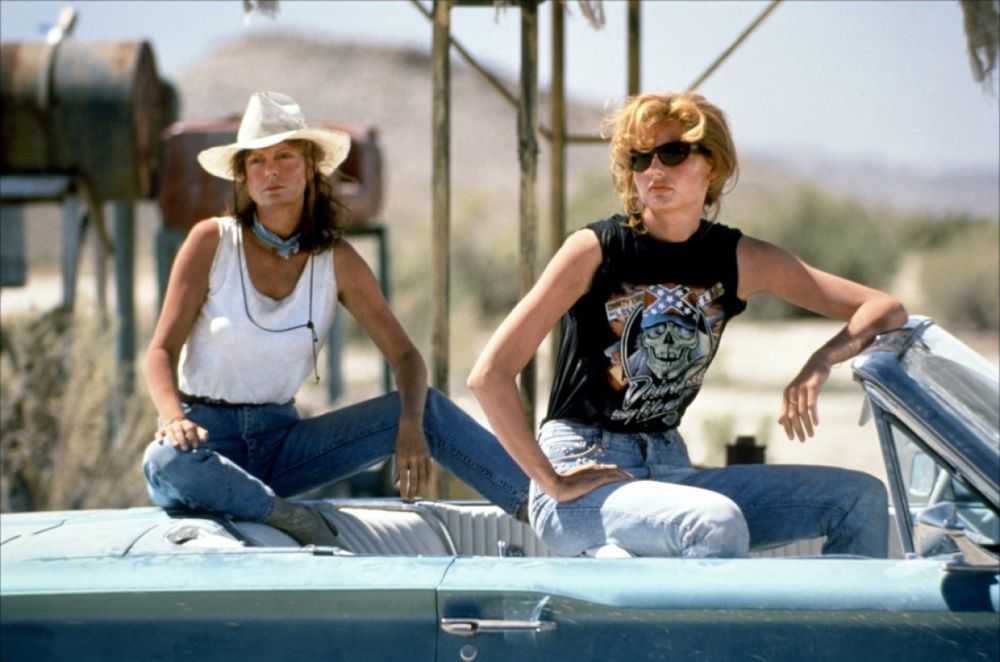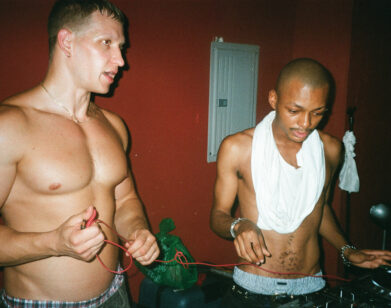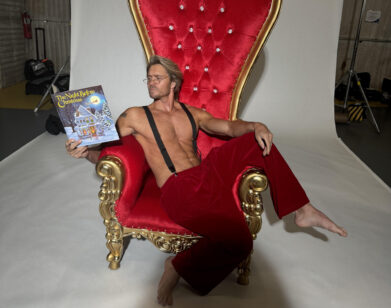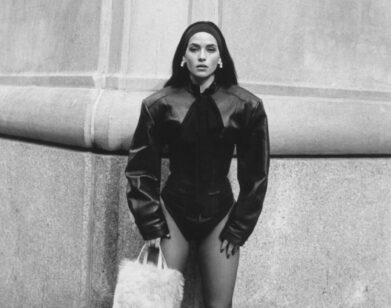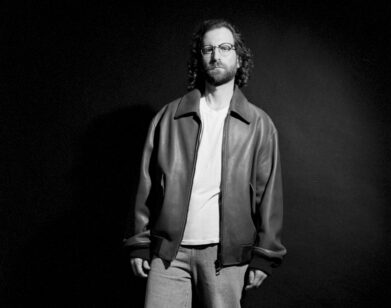Callie Khouri’s American Woman
In screenwriter and director Callie Khouri’s world, complex, interesting women are front and center, while men are often the supporting characters and love interests. From her very first screenplay Thelma & Louise, to the hit series Nashville, which she created, Khouri has flipped the script on the male-dominated Hollywood formula. For her trailblazing portraits of strong women in film and television, Khouri will be honored at the Athena Film Festival Awards Ceremony on February 8.
Thelma & Louise, the unprecedented, iconic film about two female friends on the run, earned Khouri a Golden Globe and the 1991 Academy Award for Best Original Screenplay. Her subsequent films, Something to Talk About, Divine Secrets of the Ya-Ya Sisterhood, Hollis & Rae, and Mad Money, explore the recurring themes of female friendships and bucking male-controlled systems.
As creator and executive producer of Nashville, Khouri has created smart, fierce female characters, led by Connie Britton and Hayden Panettierre, in Emmy and Golden Globe-nominated performances, and also employs a largely female writing and directing team. The Athena Film Festival, which runs from February 6-9 at Barnard College, showcases films that highlight women’s leadership. Khouri will conduct a master class at the Festival on February 8.
LORRAINE CWELICH: What for you is the significance of receiving the Athena Film Festival’s honor?
CALLIE KHOURI: It’s really nice to see them staying on top of the issue of women in film. Melissa [Silverstein, Athena’s Artistic Director], in particular, is really good at making sure people realize how out-of-whack the numbers are, disproportionately, for how many women are trying to work in this business compared to those who actually have long careers. The numbers are embarrassing. So it’s really nice to be recognized, especially by Melissa, who has taken this fight to the streets by talking about it and not letting it go away. It’s also just nice to be honored and know that your work is having some kind of impact.
CWELICH: How has the issue of women in power in Hollywood changed since you broke into the business? And what needs to occur in order to see greater progress?
KHOURI: I wrote Thelma & Louise in 1988 and we shot it in 1990. Everyone kept saying, “This is so groundbreaking… this is going to change the landscape,” but I don’t see that result at all. When we saw some female studio executives, we were hopeful that more women would be hired as directors, but that didn’t really seem to happen. It’s hard to make a case that there’s been a huge amount of progress. Obviously there’s been some. But now I’m working in television, and it’s slightly better. You can point to a lot of women showrunners that have had long and successful careers. In terms of the kinds of movies that women can get made, as long as the business operates under this model of the first-weekend [box office] focus, with huge movies aimed at super-young audiences, it will be really tough for women to do something that really changes the landscape. Because honestly, until they figure out how to get grown women into the theaters on the first weekend, it won’t change. Gravity is a great example of a movie that we hope they’re going to do more of. It’s really entertaining, with a female star. It’s not the kind of film you typically see, and gives me hope.
CWELICH: Nashville, which features women directors and writers, in addition to strong female lead characters, serves as an industry model.
KHOURI: When I came up with the story, these two women characters just came into my head. When I knew I wanted to do a story set in Nashville, I asked myself what story did I want to tell? The first thing that popped into my head was a woman rushing around, getting ready to go to work, yelling at her kids, and then cutting to the stage of the Grand Ole Opry and having her be the star of the show. That was the work she was going to. And I wanted it to be about the music business, which is in terrible disarray. One by one, the story fell in line after that. Then when we hired the writers, we hired the people we thought best understood where we were going and what we wanted to do. We’ve hired so many women directors; our track record has been really good. That’s from not even thinking about it; it’s from hiring the best person we can get.
CWELICH: Connie Britton is as much a force of nature in Nashville as she was in Friday Night Lights. She also serves as co-executive producer on your show; what type of input does she have?
KHOURI: We discuss all aspects of her character and her story. Connie is very involved in the direction of her character. At the same time, she is a new mom with a three-year-old, so we try to leave her plenty of time for that. She’s wearing a lot of hats these days. Her life is kind of a parallel situation to her character’s.
CWELICH: When a record label executive wants Hayden’s character to deliver an apology for her scandal, he says, “We broke the filly.” But they didn’t; she’s defiant. It resonates with the kind of unfettered rebelliousness and freedom of Thelma & Louise, in the face of male authority trying to control them.
KHOURI: Hayden, I think, has done a phenomenal job playing a very tricky role, someone who has made a lot of mistakes. She shoots herself in the foot in a way that young people make mistakes in that business but also has an awareness of what she’s up against and what she has to overcome. She plays all of that so beautifully, in my humble estimation. A lot of our characters are on the journey many recording artists are on, which is: how can I be true to myself and not just be a corporate shill? The corporations generally couldn’t care less who artists are or what they have to say. We put many of our characters in that struggle, because that’s where many artists are at today. Especially as the music business collapses and record companies take more of their merchandising and touring, the artist is lessened. It’s an interesting time to be writing about the music business.
CWELICH: To what extent does your husband, T-Bone Burnett, impact the show’s music?
KHOURI: He just did the first season. He’s doing True Detective and other projects now. Buddy Miller then took over, which was always the plan.
CWELICH: Is it true that after college you were a waitress in Nashville?
KHOURI: Yes, I waited tables in a bunch of different music clubs when I lived there, which is how I found my way into this story. I had a lot of friends in the business and it was really great. Nashville’s incredible; it’s one town that’s never doing to run out of stories.
CWELICH: You were on WGA’s board of directors for two terms. What did your work involve?
KHOURI: Decision-making for running the [Writers] Guild. I think we did some important stuff there. The Guild is fighting the good fight as our business kind of shrinks, too. Maintaining the rights of screenwriters is a full-time job.
CWELICH: What advice do you have for aspiring screenwriters?
KHOURI: My advice is that if you really want this, get out here and be ready to take no for an answer many times until you find your way through it and are fortunate enough to get something made. It’s a tough time for screenwriters right now, because fewer movies are getting made. I’m enjoying television so much. It offers opportunities for writers to be in a writers’ room and work their way up. It’s somewhat easier because there’s more of a community. There are so many screenwriters with incredible stories to tell, so I hope there will be some kind of shift in the business where very few types of movies are now made by the studios. There needs to be different budgets for different audiences; not everything having to be a huge opening weekend.
CWELICH: As a young screenwriter, how did you get your first screenplay produced?
KHOURI: I had been working in videos for a few years and knew a bunch of people who were starting to get movies made. When I wrote Thelma & Louise, I gave the screenplay to a friend, Amanda Temple, whose husband was Julien Temple, whom I had worked with. She knew a woman who worked with Ridley Scott. They read it, said yes, and got producers on board. I then got an agent right away because it looked like my screenplay was going to get produced by Ridley.
CWELICH: It took great courage not to create a typical “happy ending.” It was audacious.
KHOURI: I will be forever in the debt of Ridley Scott and MGM for seeing the value in that and standing by it, because plenty of places would have changed it.
CWELICH: It still stands as one of the greatest representations of an authentic female voice. Tell me about writing the screenplay.
KHOURI: It just came on its own. I didn’t think about it for years; the initial idea came and I started writing about four months later. I decided I would write it a scene at a time. I knew where I was starting and what the ending would be. And I just wrote from point A to B to C, in as free a way as I possibly could. At the time, I had never written anything. I had nothing at stake. I had nothing to lose, except to see if I could finish it, which was my only goal when I started it. I wasn’t like, “I’m going to write this thing and I’m going to make it into a movie.” The fact that it got made and went on to have the life that it had is absolutely astounding to me. It was an amazing experience creatively, because it would wake me up in the middle of the night. I’d be asleep and then awakened by an idea that I had to write down. I’d write the scene and then go back to sleep. I wanted to show that feeling of what it’s like to be in this world that wants you to be less than you are. I wanted to write a movie about what the world looked like from the front seat of that car.
THE ATHENA FILM FESTIVAL STARTS TODAY, FEBRUARY 6. CALLIE KHOURI WILL CONDUCT A MASTER CLASS ON SATURDAY, FEBRUARY 8. FOR MORE INFORMATION, VISIT THE FILM FESTIVAL’S WEBSITE.

